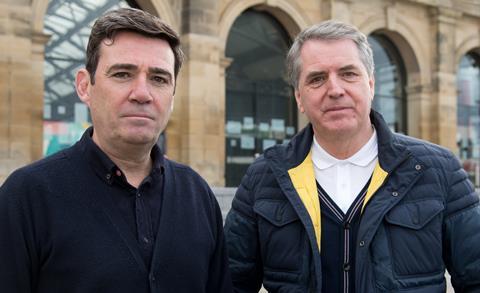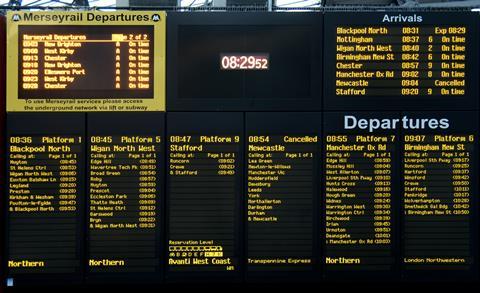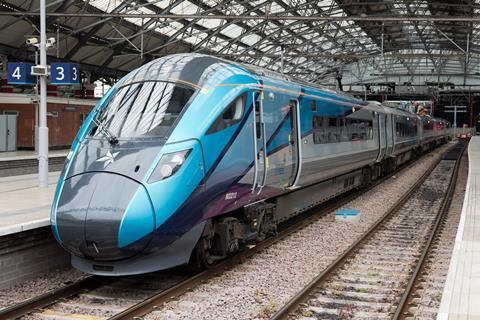
UK: The Greater Manchester and Liverpool City Region mayors have moved away from directly blaming train operators for the ongoing disruption to services in the northwest of England, instead saying the Department for Transport’s tight control of finances is preventing deals between operators and their staff.
Mayors Andy Burnham and Steve Rotheram held a press conference on the steps outside Liverpool Lime Street station on October 22 — which was delayed owing to the cancellation of their train — during which they called on the government to increase funding for operators in order to bring an end to industrial relations problems and other disruption.
In the run-up to the event the mayors had been expected to reiterate calls for TransPennine Express and Avanti West Coast to have their contracts terminated and for the government’s Operator of Last Resort to take over.
However, they said that is clear that service reductions and last-minute cancellations would continue regardless of who is managing the businesses, in the absence of the ability to reach new agreements, particularly over rest day working.
Public misled

The mayors agreed that attempts by ministers to suggest the companies can resolve the disputes have misled the public, noting that the contracts imposed by DfT mean operators cannot put forward offers to staff without ministerial clearance. In the case of rest day working, several TOCs have confirmed that DfT has refused to endorse deals that would see this reinstated.
The mayors said their train to Liverpool would have run if rest day working had been in place at TransPennine Express.
Burnham insisted that they cannot and will not accept the current situation, saying ‘if the Conservative Party wants to prove it can still run this country it needs to fix this’.
He added that ‘these train companies could do much better than they’re doing, but they’ve been put in a financial straitjacket after the pandemic which has taken a lot of money out of the contracts so that they can’t pay for the rest day working that the railway relies upon.
‘There is a common thread here: that is the government’s responsibility to put the money in the contracts so that they can run the service and that’s what we’re calling on the Transport Secretary today to do, to make an immediate injection of funds into TransPennine Express, Northern as well as Avanti to allow rest day working so that we can have a service back.’
Rotheram said ‘passengers have had enough and if we put our mind to it we can come to an amicable agreement on this. Enough is enough.’
Addressing the continuing disruption at AWC, Rotheram commented that ‘it is really important for the economy of our region that we do have a quality inter-city train service, and at this moment it’s really poor. Staff have just been talking to us about diagrams and rostering, and how the company can effect change; they are not talking to the staff and that’s part of the problem.’
Burnham added ‘the change between Virgin and Avanti was massive in the way that they are treating the staff. They are not running things properly, so it is their responsibility as well as the government.’
Funding and deadline preferred

Rotheram suggested that while transfer to an operator of last resort might be an option for AWC and TPE, both mayors agreed that operators needed to be given appropriate funding and a chance to prove they can run services before having their contracts terminated.
Burnham said that with Avanti and TransPennine Express both being operated by FirstGroup, ‘there is a common theme’, before agreeing that injecting more money into the contracts would deliver immediate improvements.
‘I want to be fair to Northern because I think they are better than they were now they are with the Operator of Last Resort, if they get a new arrangement around rest day working they can get better still’, Burnham added.
He went on to suggest that their desired option would be for government to put improved funding in place alongside a deadline for restoration of full services on TPE and a return to three trains an hour between Manchester and London from AWC by mid-December, with a move of the contracts to OLR if this was not achieved.
Both mayors also suggested that DfT should look again at passing control of rail services in the north of England to local bodies. Burnham said that in Manchester patronage on trams and buses is rising, while on trains ‘it is falling due to a lack of trust in the service’.
‘All of the flaws and the cracks’ exposed

Asked by Rail Business UK whether the public understand the control which DfT has on operators, specifically around pay and rest day working agreements, and whether ministers are misleading the public by suggesting that the companies are responsible, Burnham said ‘that is why we’ve made a change today. The companies do bear a considerable degree of responsibility for the chaos so I’m not letting them off the hook, but there is this question of the financial straitjacket in which they were placed following the pandemic.
‘I’ve been told that that has removed a lot of the money that used to be used to smooth things over, to pay for rest day working. The removal of that money has exposed all of the flaws and the cracks in the railways of the north of England. Absolutely the government is in the frame here and their stock response of pointing at the unions, saying it’s their fault, is also misleading the public and that’s why we’re calling it out.’
Both mayors praised the accessibility of newly appointed Secretary of State for Transport, Anne-Marie Trevelyan, ‘a northern MP who has been listening’, but Burnham added that ‘we do now need to see action from her’.
Rotheram said the constant ‘moving of the chairs at government’ has meant that DfT is ‘departmentally dysfunctional’, which means that pushing things at government level is impossible ‘because it’s clogged’.
‘I feel desperately sorry for the train operating companies who don’t know who they’re going to be speaking to one month after another’, he concluded.



